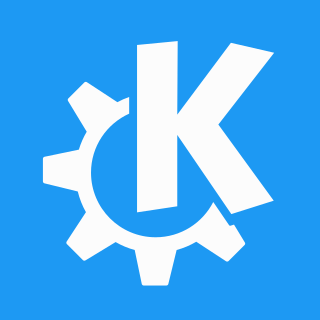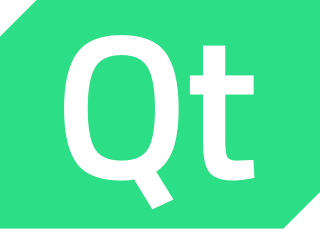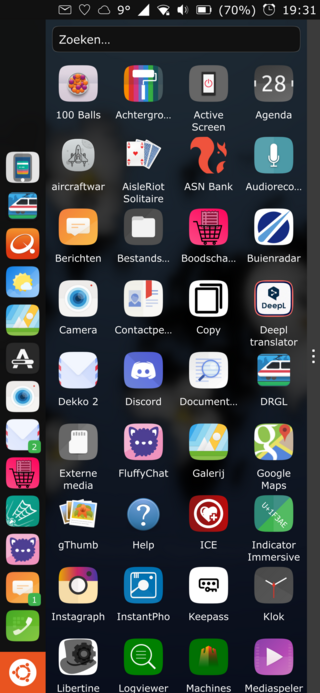
KDE is an international free software community that develops free and open-source software. As a central development hub, it provides tools and resources that allow collaborative work on this kind of software. Well-known products include the Plasma Desktop, KDE Frameworks, and a range of cross-platform applications such as Amarok, digiKam, and Krita that are designed to run on Unix and Unix-like operating systems, Microsoft Windows, and Android.

Calligra Suite is a graphic art and office suite by KDE. It is available for desktop PCs, tablet computers, and smartphones. It contains applications for word processing, spreadsheets, presentation, databases, vector graphics, and digital painting.

Qt is cross-platform software for creating graphical user interfaces as well as cross-platform applications that run on various software and hardware platforms such as Linux, Windows, macOS, Android or embedded systems with little or no change in the underlying codebase while still being a native application with native capabilities and speed.

Maemo is a software platform originally developed by Nokia, now developed by the community, for smartphones and Internet tablets. The platform comprises both the Maemo operating system and SDK. Maemo played a key role in Nokia's strategy to compete with Apple and Android, and that strategy failed for complex, institutional and strategic reasons.

Compiz is a compositing window manager for the X Window System, using 3D graphics hardware to create fast compositing desktop effects for window management. Effects, such as a minimization animation or a cube workspace, are implemented as loadable plugins. Because it conforms to the ICCCM conventions, Compiz can be used as a substitute for the default Mutter or Metacity, when using GNOME Panel, or KWin in KDE Plasma Workspaces. Internally Compiz uses the OpenGL library as the interface to the graphics hardware.

Hildon is an application framework originally developed for mobile devices running the Linux operating system as well as the Symbian operating system. The Symbian variant of Hildon was discontinued with the cancellation of Series 90. It was developed by Nokia for the Maemo operating system. It focuses on providing a finger-friendly interface. It is primarily a set of GTK extensions that provide mobile-device–oriented functionality, but also provides a desktop environment that includes a task navigator for opening and switching between programs, a control panel for user settings, and status bar, task bar and home applets. It is standard on the Maemo platform used by the Nokia Internet Tablets and the Nokia N900 smartphone.
In FOSS development communities, a forge is a web-based collaborative software platform for both developing and sharing computer applications.

Ubuntu One is an OpenID-based single sign-on service operated by Canonical Ltd. to allow users to log onto many Canonical-owned Web sites. Until April 2014, Ubuntu One was also a file hosting service and music store that allowed users to store data "in the cloud".
oFono is a free software project for mobile telephony (GSM/UMTS) applications. It is built on 3GPP standards and uses a high-level D-Bus API for use by telephony applications. oFono is free software released under the terms of the GNU General Public License v2.

The Nokia N900 is a smartphone made by Nokia. It supersedes the Nokia N810. Its default operating system, Maemo 5, is a Linux-based OS originally developed for the Nokia 770 Internet Tablet. It is the first Nokia device based upon the Texas Instruments OMAP3 microprocessor with the ARM Cortex-A8 core. Unlike the three Nokia Internet tablets preceding it, the Nokia N900 is the first Maemo device to include phone functionality.

MeeGo is a discontinued Linux distribution hosted by the Linux Foundation, using source code from the operating systems Moblin and Maemo. Primarily targeted at mobile devices and information appliances in the consumer electronics market, MeeGo was designed to act as an operating system for hardware platforms such as netbooks, entry-level desktops, nettops, tablet computers, mobile computing and communications devices, in-vehicle infotainment devices, SmartTV / ConnectedTV, IPTV-boxes, smart phones, and other embedded systems.
Qt Quick is a free software application framework developed and maintained by the Qt Project within the Qt framework. It provides a way of building custom, highly dynamic graphical user interfaces with fluid transitions and effects, which are becoming more common especially in mobile devices. Qt Quick includes a declarative scripting language called QML.
QML is a user interface markup language. It is a declarative language for designing user interface–centric applications. Inline JavaScript code handles imperative aspects. It is associated with Qt Quick, the UI creation kit originally developed by Nokia within the Qt framework. Qt Quick is used for mobile applications where touch input, fluid animations and user experience are crucial. QML is also used with Qt3D to describe a 3D scene and a "frame graph" rendering methodology. A QML document describes a hierarchical object tree. QML modules shipped with Qt include primitive graphical building blocks, modeling components, behavioral components, and more complex controls. These elements can be combined to build components ranging in complexity from simple buttons and sliders, to complete internet-enabled programs.
Ubuntu Single Sign On is an OpenID-based single sign-on service provided by Canonical to allow users to log into many websites.

LightDM is a free and open-source X display manager that aims to be lightweight, fast, extensible and multi-desktop. It can use various front-ends to draw the user interface, also called Greeters. It also supports Wayland.

Dooble is a free and open-source web browser that was created to offer improved privacy for users. Currently, Dooble is available for FreeBSD, Linux, macOS, OS/2, and Windows. Dooble uses Qt for its user interface and abstraction from the operating system and processor architecture. As a result, Dooble should be portable to any system that supports OpenSSL, POSIX threads, Qt, SQLite, and other libraries.

Mer was a free and open-source software distribution, targeted at hardware vendors to serve as a middleware for Linux kernel-based mobile-oriented operating systems. It is a fork of MeeGo.

Ubuntu Touch is a mobile version of the Ubuntu operating system, being developed by the UBports community. Its user interface is written in Qt, and is designed primarily for touchscreen mobile devices such as smartphones and tablet computers, but the original goal of convergence was intended to bring Ubuntu Touch to laptops, desktops, IOT devices and TVs for a complete unified user experience.

Maliit is an input method framework for computers with particular focus on implementing virtual keyboards. Designed mostly for touchscreen devices, Maliit allows the inputting of text without the presence of a physical keyboard. More advanced features such as word correction and prediction are also available.














